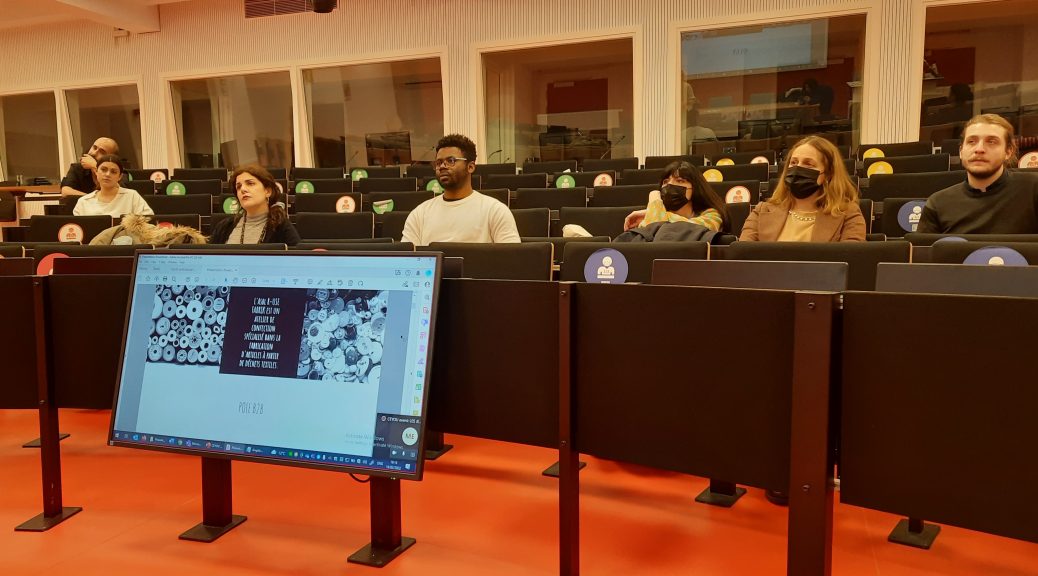On 16th February, ACR+ organised a debate in Brussels as an opportunity to gather people involved in circular economy in different ways and to start building bridges between already existing initiative, young people and public authorities.
If you missed the debate, watch the full recording here.
The event was opened by Serena Lisai, from ACR+, who presented the main results of CEYOU:
- Guidelines to establish a permanent dialogue between local authorities and youth youth organisations;
- A toolkit that collects the main Online Resources needed to organise a circular initiative;
- A toolkit to define the steps to follow to implement a circular initiative.
Find the full presentation here.
Young people were asking for some attention and they wanted to be involved in sustainability, circular economy, they wanted to be protagonist of the transition, and with CEYOU we developed engagement strategies to give them the right tools to act! (Serena Lisai, ACR+)
Angela Karadog, coordinator of the CEYOU project, described the activities implemented locally in Pontygrip in the framework of CEYOU. She involved an already quite active group of “Young Friends of the Earth” in online workshops to imagine together the future of their city. Their ideas became the material for an exhibition. During another meeting they had the opportunity to discuss and ask questions to representatives of local and EU authorities, finally developing a detailed action plan. Each kid was made responsible of a specif idea and activity. The group has been contacted by politicians, such as the Welsh Parliament and the local Council, but also by businesses and even The Guardian.
Watch the video from Angela here.
For the next step, I’m going to leave that to them to decide and whatever they decide, we will support them. So that youth focuses on what they want to do and not on what we want them to do and forcing them to do those things. They really love talking, they love standing up, being heard and to know that they are being heard, that’s really important. (Angela Karadog, Pontypridd Youth Forum)
Max Eisenbart was invited as representative of the Fryslan Province (The Netherlands) and as 21 years old BSc student in Global Responsibility and Leadership, youth Coordinator at Regional Center Expertise (RCE) SPARK Fryslan, and Education for Climate Companion. He presented the association Circular Fryslan, which counts over 100 companies, knowledge institutes, and local governments. SPARK the Movement is a programme that focuses on youth and education, following a circular learning approach, promoting the development of the knowledge and skills, but also the values and attitudes of circular economy. The programme focuses on the whole education, from primary schools to universities and beyond.
Discover more on the challenging Fryslan circular goals on this video and check here the presentation of Max.
We need to structurally engage youth through education, when we want to come to sustainable society. And therefore we need a long-term vision but actually also “Be a rebel!”. That is both for educators but also for the students is really a thing to draw outside of the line, dare to question systems, dare to do it a little bit different because this is how youth can also make the difference. (Max Eisenbart, Fryslan Province)
Chloé Mikolajczak, from the Restart project, presented the Right to Repair campaign (R2R). The main goal of the campaign is to fight for a universal right to repair so that all products are included and to fight for the right to repair not only in approved stores (such as big companies) but also in independent repairers/stores. Moving to repairing calls a cultural change, which takes time. Thus, the companies have to be framed and guided trough laws, while acting to raise the consumers’ awareness.
Find a summary in English here.
Between 55 and 58 million tons of electronic waste are thrown away every year, representing the fastest growing waste stream in the world. For instance, smartphones are changed on average every 2/3 years while they should be used for 25 years in order to compensate their ecological impact. (Chloé Mikolajczak, Restart project)
Sophie Remy represented R-Use Fabrik, which a circular initiative Brussels-based divided into 2 main activities: clothing workshops specialized in the manufacture of articles from used textile and an Eco-responsible haberdashery. The workshops are based on sewing and up-cycling and can be organised privately or for groups. R-Use Fabrik aims at reusing up to 3.8 million tons of textile.
Check the full presentation here and the summary in English.
The textile industry is one of the most polluting sectors in terms of water pollution and CO2 emissions. The impact on waste production is also huge since, each year, from the 5 million tons of textiles put on the EU market, 4 millions are thrown away. And recycling is still not the answers since only 1% of the collected clothes are recycled (87% are incinerated or sent to the landfills). (Sophie Remy, R-Use Fabrik)
Paula Antón brought the example of Finnova Foundation as non-profit organisation involved in circular initiatives at local and European level. Finnova supports the financing of innovation of companies, regions and municipalities (local and international level) in sustainable development, circular economy and water management. In line with the European Year of Youth 2022, Finnova created the EU training platform, an online learning platform containing courses on European funds, circular economy, LIFE program, EU communication, etc.
Find the full presentation of Paula here, and a summary in English.
The event was concluded by a collection of insights from the participants on the topic of circular economy and, in particular, on how to include this approach on our everyday life.

